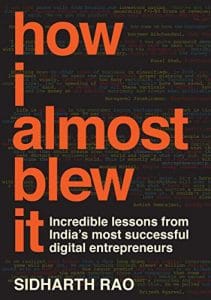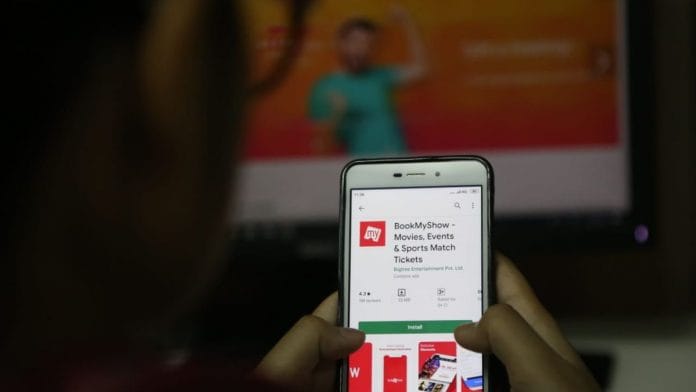ASHISH HEMRAJANI WAS A PART OF THE MAD MEN world long before the show became a televised sensation. He was living life in the fast lane as an account manager at J. Walter Thompson but was constantly afraid that everything could go up in smoke any day. He needed to get out of the jaded and uninspiring environment and recharge so he booked a vacation to visit South Africa, Zimbabwe and Botswana. He had no idea that the journey would alter the course of his destiny. The idea of BookMyShow struck him, quite like the Newtonian apple, as he sat under a big tree in the Storms River Valley. A radio commercial selling rugby tickets online on the portal Computicket helped him gravitate towards the idea. Computicket was the original avatar of Ticketmaster and the inventor of event ticketing.
The idea was quite straightforward. It did away with pricing arbitrage, made ticketing information accessible, and was convenient for users. This was a novel concept for the Indian market where the purchase of a simple movie ticket meant queuing up outside cinema-halls to try your luck at pigeonhole-sized windows without the assurance that your patience would be rewarded.
Moreover, black marketing of tickets for popular films was rampant and the paan wala sitting opposite the box office was more likely to have tickets to the show than the man sitting at the window. The paan wala, a man with oily hair and red-stained lips, was sure to charge you four times the cost of the ticket. It was usually a huge gamble because the cinemagoer had no idea whether tickets would be available, and if available, then how many they’d be able to purchase and whether they would even get seats of their choice.
Cricket fans had to face bigger challenges. They not only had to not stand in long queues while getting drenched in the pouring rain or fainting in the sweltering heat, they also had to escape the policemen who carried lathis and took immense pleasure in beating up restless ticket buyers.
Hence, the idea of an online ticketing service stuck with Ashish who was well aware of these issues. While in Stellenbosch—the Napa Valley of South Africa—he had a few too many glasses of Merlot. He woke up with a searing headache and an awful realisation that at some point during the night, he had resigned in a text message to his boss. Caught between a rock and a hard place, Ashish had no option but to try his luck and hope that the start-up idea which had germinated in his head would bear fruit.
Also read: NITI Aayog CEO Amitabh Kant surprised that Delhi-NCR has more start-ups than Bengaluru
***
Learning the Ropes
Like Zomato and Delhivery, BookMyShow’s work involved physical delivery of tickets and in cases of COD, the receipt of payment as well. It doesn’t require one to be a rocket scientist to deduce that such a model can be a logistical nightmare. This was the pre-smartphone era, which meant that even the basic technology that we are highly dependent on was still in the making. Putting it euphemistically, Ashish and his partners had more than their fair share of last mile challenges. For instance, in 2001, Bryan Adams was going to perform in India. Tickets for the concert were selling like hot cakes but there was panic in the company’s back offices. They had booked and sold their entire inventory of tickets but the money they received just didn’t seem to add up. They dug deep and found out that they had thousands of undelivered tickets. There was a problem on the ground. Ashish could never have predicted since it was his first encounter with such a situation. Movie tickets are cheaper at about ₹100 or ₹200 apiece. Even if someone orders five to six tickets, the amount would still be around ₹500 or ₹600 and the buyer could always pay the cash upfront on delivery.
Concert tickets, on the other hand, cost around ₹1000 per ticket. The customers going for the concerts usually book them in a bunch of five to six tickets. This meant that the person booking the ticket would have to pay around ₹5000 or so upfront. Since no one carried around that much cash in their wallet, every time our delivery guys went to drop off the tickets, the buyer would take time to make the payment by collecting it from friends or by going to the ATM. But the delivery guys who were on a tight schedule couldn’t wait so they would simply leave. You see, we had all those NDRs (Non-delivery receipts) which came back to us,’ Ashish narrates.
During such moments, the core team had to go into the muck and get their hands dirty. ‘We split into teams. Some of us handled the calls at the call centre and the rest of us took the tickets in our cars and delivered them ourselves. All hands on deck! It was situations like these that prepared us for the worst and turned us into professionals,’ Ashish recalls.
Start-up founders need to get their hands dirty. That’s the only way to build a sound and successful organisation. They cannot be problem-solvers or fine tune the system unless they become aware of the problems hitting the employees on the ground. Inexperienced founders can’t even learn to delegate work until they have worked on all the stages. It doesn’t have anything to do with being a blue or a white collared employee. It’s about constructing the DNA of the start-up as these things cascade from downwards.
Founders have to be willing to step into the thick of the situations, pick up the phones and delivery cartons whenever needed which demonstrates the strength of the leadership and the desire to succeed. It sends the right message to the employees because it also stokes their desire to constantly learn and remain vested in the organization’s growth. Ultimately, the buck stops with the founders but unfortunately, there are also certain founders who confuse delegation with abdicating their own responsibility. However, Ashish and his co-founders don’t belong to that ilk. They knew the need of the hour and were always willing to roll up their sleeves and focus on getting the job done. BookMyShow’s eventual success is a testament to these traits.
Since it was a novel business model, the hiccups in the system were also unprecedented. The team had to constantly improvise and much of the learning was done on the job itself. They didn’t have a GPS tracking system, camera phones or even the ability to a purchase a complex Customer Relationship Management (CRM) system. Difficult customers were challenging to deal with, and in the absence of reliable technology, they had to devise their own methods of keeping track on customer behaviour and patterns. ‘Sometimes, customers simply denied that our delivery boys had tried to reach them, especially in Delhi. With no means to prove that the customer was wrong, and that we had indeed gone with the delivery and the customer wasn’t at home to receive it, we came up with our own jugaad. We told our delivery guys to make a note of the description of the door. If a customer called and denied the delivery attempt, we promptly described the colour of the door, the type of bolt on the door and certain other specifics of the entrance of the particular address. The customer didn’t lie again,’ says Ashish, grinning at his own ingenuity.
Also read: India must boost start-ups to catch up with China’s private space firms
But that wasn’t all. Worse problems were showing up. Customers like a certain Pappu Pehelwan from Paharganj would always snatch away the tickets and shut the door on the delivery boy’s face during every third transaction. They had to make a note of such errant clients and blacklist them to prevent losses. There were also moments of amusement attained at the expense of the clients. A certain Mr Khanna (name changed, of course) would always buy four tickets for family films and have them delivered to his house. However whenever he bought the tickets for a sleazy film, he would purchase only two and have them delivered to his office. ‘We didn’t really need a data scientist from Israel to figure out that Khanna was having an affair,’ Ashish laughs.
 This excerpt from the book How I Almost Blew It by Sidharth Rao has been published with permission from Westland.
This excerpt from the book How I Almost Blew It by Sidharth Rao has been published with permission from Westland.






